
Ride your bike 20 minutes a day
When German researchers had 100 men with mild chest pain, or angina, either exercise 20 minutes a day on a stationary bike or undergo an angioplasty, they found that a year after the angioplasty, 21 men suffered a heart attack, stroke, or other problem compared to only six of the bikers. Just remember that if you already have angina, you should only begin an exercise program under medical supervision.
These are the 15 best workouts for people who hate exercise.

Eat a piece of dark chocolate several times a week
Believe it or not, several small studies suggest dark chocolate could be good for your heart! The beneficial effects are likely due to chemicals in chocolate called flavonoids, which help arteries stay flexible. Other properties of the sweet stuff seem to make arteries less likely to clot and prevent the “bad” cholesterol, LDL, from oxidizing, making it less likely to form plaque.
This is what really causes an enlarged heart, according to a heart doctor.

Have a beer once a day
A study published in the Journal of Agricultural and Food Chemistry found that men who drank one beer a day for one month lowered their cholesterol levels, increased their blood levels of heart-healthy antioxidants, and reduced their levels of fibrinogen, a protein that contributes to blood clots.
Here’s why binge drinking is on the rise in Canada—and why it’s so dangerous.
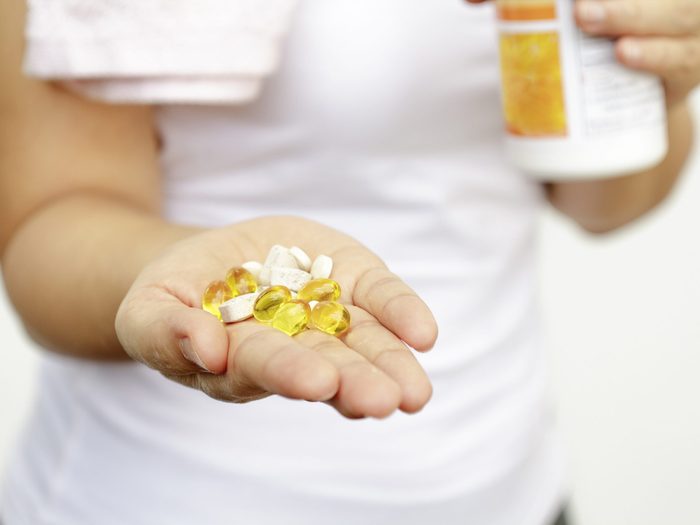
Take a B vitamin complex every morning
When Swiss researchers asked more than 200 men and women to take either a combination of three B vitamins (folic acid, vitamin B6, and vitamin B12) or a placebo after they had surgery to open their arteries, they found that levels of homocysteine, a substance linked to an increased risk of heart disease, were 40 per cent lower in those who took the vitamins.
Your body needs these 13 essential vitamins to stay healthy.

Tape-record yourself at night
If you hear yourself snoring (or if your sleeping partner has been kicking you a lot), make an appointment with your doctor. You may have sleep apnea, a condition in which your breathing stops hundreds of times throughout the night. It can lead to high blood pressure and other medical problems, and even increase your risk for heart attack and stroke.
Partner’s snoring driving you nuts? Here’s how you can stop it!

Go to bed an hour earlier tonight
A Harvard study of 70,000 women found that those who got less than seven hours of sleep had a slightly higher risk of heart disease. Researchers suspect lack of sleep increases stress hormones, raises blood pressure, and affects blood sugar levels.

Eat fish at least once a week
Have it grilled, baked or roasted—just have it. A 2018 study published in scientific journal Circulation found that eating one to two meals of non-fried fish or shellfish per week can prevent heart disease, heart failure and sudden cardiac death. The American Heart Association recommends eating two 3.5-ounce servings of non-fried fish every week.
Check out these 10 brain-boosting seafood recipes!
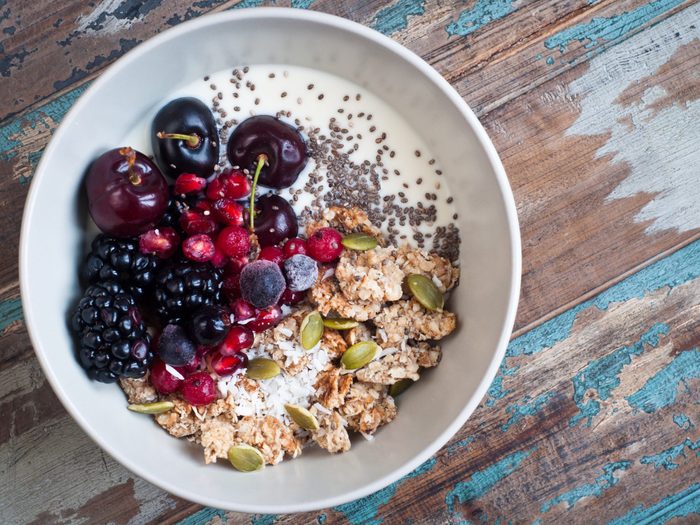
Eat a high-fibre breakfast
In a 2017 study published in the Journal of Chiropractic Medicine, researchers found that individuals consuming high amounts of dietary fibre can drastically reduce their risk of cardiovascular disease.
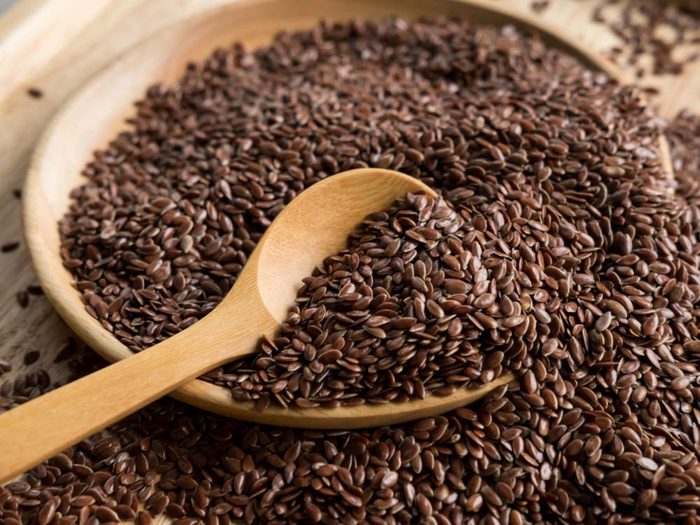
Sprinkle one ounce of ground flaxseed on your cereal or yogurt every day
This way you’ll be getting about two grams of omega-3 fatty acids, healthy fats that numerous studies find help prevent heart disease and reduce your risk of dying suddenly from heart rhythm abnormalities.
Flaxseed is also one of the 23 foods that can lower your blood pressure.
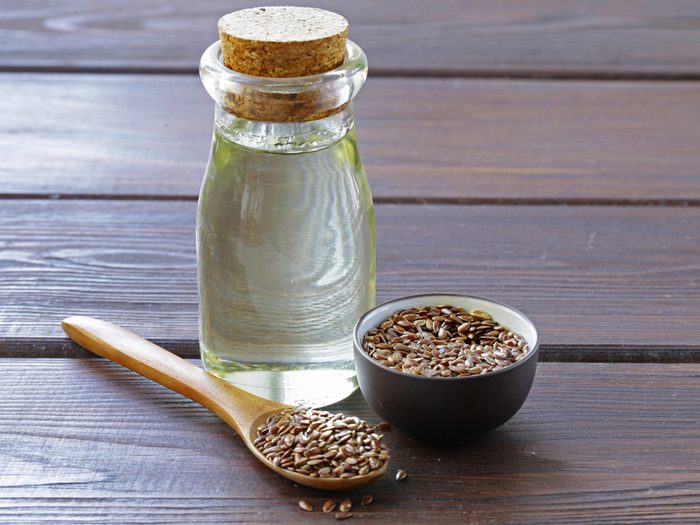
Make fresh salad dressing with one tablespoon of flaxseed oil
Flaxseed oil packs a whopping seven grams of omega-3 fatty acids.
Keep your digestive tract healthy with these foods that are natural laxatives.
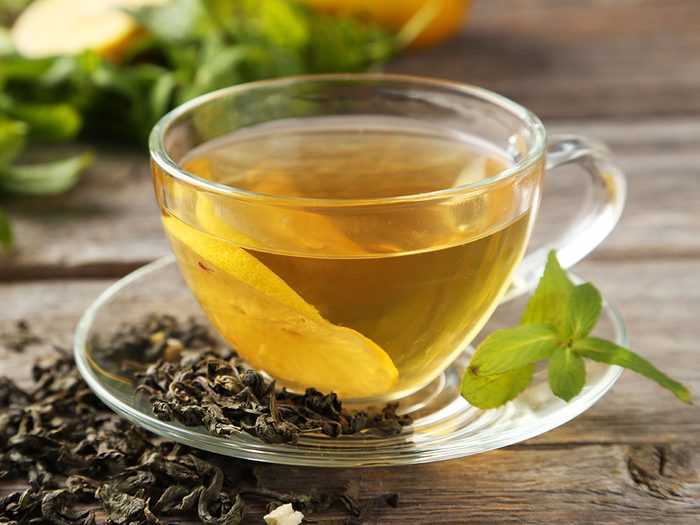
Drink at least two cups of tea a day
Black tea or green tea, it doesn’t seem to matter. At least, that’s the result of a Dutch study that found only 2.4 per cent of 5,000 healthy Rotterdam residents who drank two or more cups of tea a day had a heart attack within six years, compared with 4.1 per cent of those who never drank tea. Another major analysis of 17 studies on tea drinkers found three cups a day could slash the risk of a heart attack by 11 per cent.
Don’t miss these 11 health benefits of green tea you haven’t heard before.
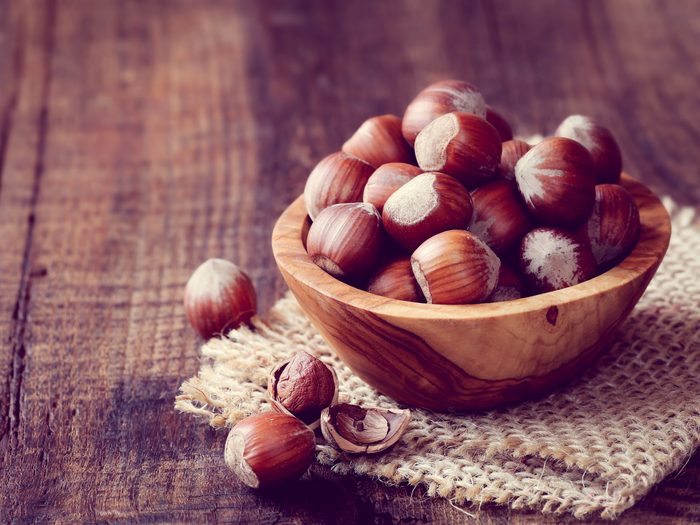
Stir a handful of hazelnuts into a vegetable-and-chicken stir-fry
Just 1.5 ounces of these healthy nuts a day can reduce your risk of cardiovascular disease. Another hazelnut idea: Crush them and use to coat fish or chicken, then bake.
Check out these 16 classic home remedies with surprising new benefits!
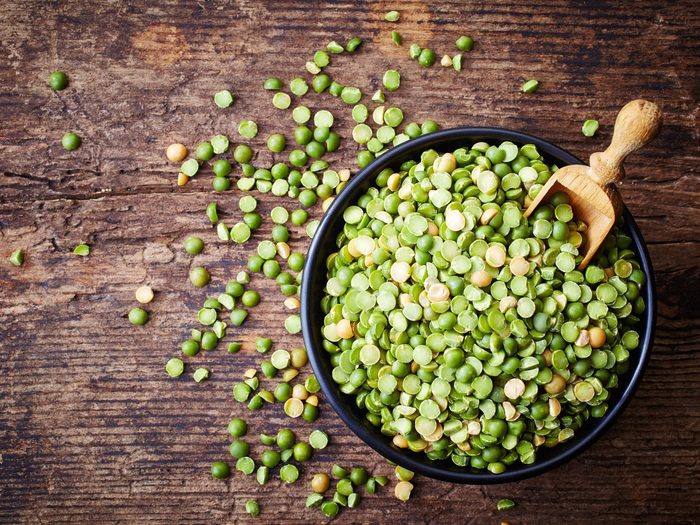
Include beans or peas in four of your dishes every week
Researchers at Tulane University found that people who followed this advice slashed their risk of heart disease by 22 per cent compared to those who ate fewer legumes.
These two exercises can cut your risk of heart disease in half.

Have sex tonight
It counts as physical activity, which, of course, is good for your heart. And that may be why University of Bristol researchers found that men who have sex at least twice a week are less likely to have a stroke or other cardiovascular problems than men who have it less often.
Can you guess the worst time of day to have sex?
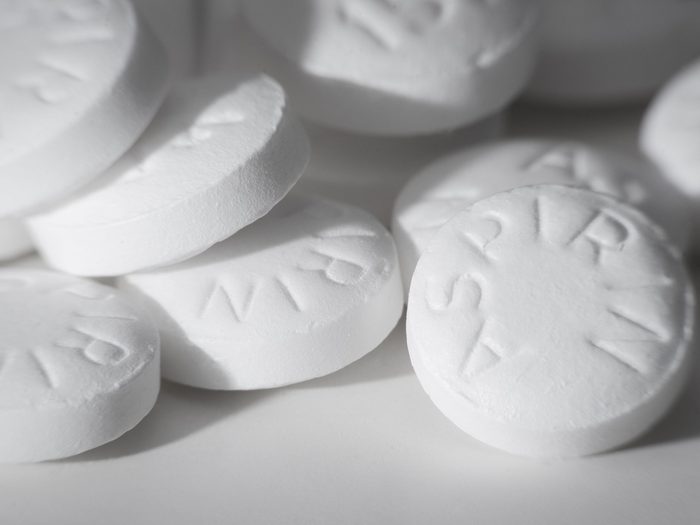
Take a baby aspirin every day
University of North Carolina researchers found that the tiny tablet slashes the risk of heart disease by nearly a third in people who have never had a heart attack or stroke but who were at increased risk (because they smoked, were overweight, had high blood pressure, or had some other risk factor). Just double-check with your doctor that there’s no reason for you not to take aspirin daily.

Eat 15 cherries a day
Studies find the anthocyanins (plant chemicals) that give cherries their scarlet colour also work to lower levels of uric acid in blood, a marker for heart attacks and stroke. Try sprinkling dried cherries on your salad or substituting a cup of cherry juice for orange juice in the morning.
Every woman should know these five facts about heart disease.
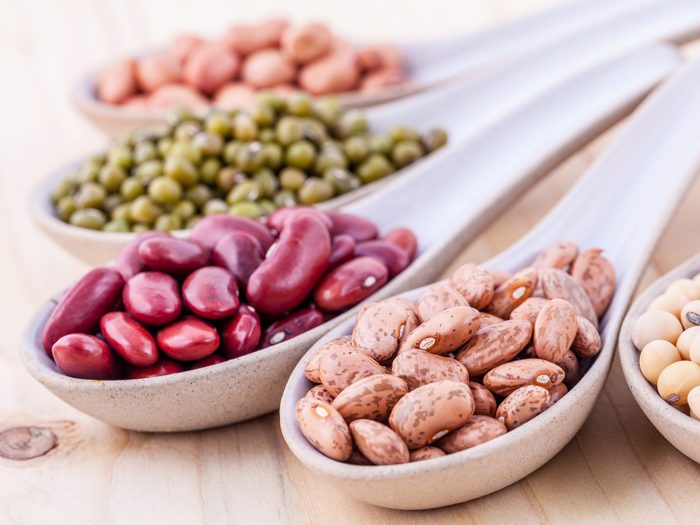
Eat one cup of beans per day
Do that and you’ll be getting at least 300 micrograms of folate. A study from Tulane in New Orleans found people who consumed at least that much folate slashed their risk of stroke 20 per cent and their risk of heart disease 13 per cent more than those who got less than 136 mcg per day of the B vitamin.
Find out how to control these 10 risk factors for heart disease.

Eat an orange every day
Or drink a glass of orange juice. Oranges, as you know, are a great source of vitamin C. Studies suggest diets high in this vitamin may reduce your risk of stroke, especially if you smoke. Tired of oranges? Substitute a bowlful of strawberries, a serving of Brussels sprouts or broccoli, or a chopped red bell pepper.
Learn the reason why your vitamin D supplements aren’t working.

Skip the soda and have orange juice instead
The reason has to do with inflammation, the body’s response to damage or injury. Chronic inflammation, linked to heart disease, is significantly affected by what you eat. For instance, researchers at the State University of New York found that drinking glucose-sweetened water triggered an inflammatory response in volunteers, but drinking the same calories in a glass of orange juice didn’t. They theorize that the anti-inflammatory effects of vitamin C and various flavonoids in juice may provide some protection.
Nourish your body with these 16 anti-inflammatory foods.

Drink an 8-ounce glass of water every two hours
A study from Loma Linda University in California found that women who drank more than five glasses of water a day were half as likely to die from a heart attack as those who drank less than two. This is likely due to the fact that maintaining good hydration keeps blood flowing well; dehydration can cause sluggish blood flow and increase the risk of clots forming.
Don’t forget these surprising benefits of staying hydrated.

Cook with ginger or turmeric twice a week
Ginger and turmeric have anti-inflammatory benefits, and inflammation is a major contributor to heart disease.
Check out these 10 things that happen when you eat more turmeric.

Go to the loo whenever you feel the urge
Research at Taiwan University found that a full bladder causes your heart to beat faster and puts added stress on coronary arteries, triggering them to contract, which could lead to a heart attack in people who are vulnerable.
Keep these superfoods in mind for a healthy gallbladder diet.

Ask for next Monday and Friday off
Researchers at the University of Pittsburgh analyzed data on more than 12,000 middle-aged men from the Framingham Heart Study and found that those who took regular vacations sliced their risk of death from heart disease by a third.
Check out these five healthy work habits from Europe!

Drive with the windows closed and the air conditioning on
This reduces your exposure to airborne pollutants, which a Harvard study found reduces something called “heart rate variability,” or the ability of your heart to respond to various activities and stresses. Reduced heart rate variability, also called HRV, has been associated with increased deaths among heart attack survivors as well as the general population.
Never ignore these silent signs of a heart attack.
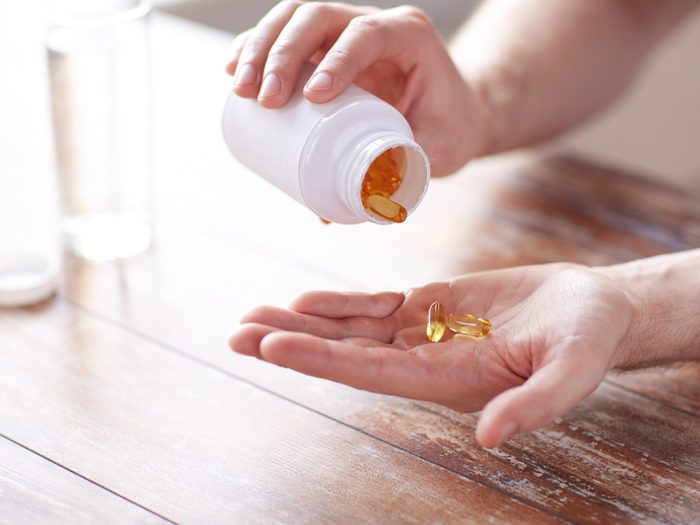
Keep a bottle of multivitamins on your kitchen counter
Make the pills a regular addition to breakfast. After six months of taking daily multivitamins, participants in one study had significantly lower levels of a protein connected with inflammation than those who didn’t take a vitamin.

Call a friend and arrange dinner
A study published in the journal Psychosomatic Medicine found that individuals who spent more time with their loved ones experienced a significant dip in blood pressure.
The key to healthy aging? Here are five ways getting active keeps you young!

Pay attention to the basics
A 2017 study published in the medical journal Heart Views found that the biggest risk factors for heart disease are high blood pressure, high blood cholesterol levels, smoking, diabetes, obesity, lack of physical activity, an unhealthy diet, and stress. The study concluded that these risk factors, while significant, can be more or less controlled.

Take a supplement containing the amino-acid L-arginine
A study published in the Proceedings of the National Academy of Sciences found that while moderate exercise alone reduced the development of atherosclerosis, or hardening of the arteries, adding L-arginine and the vitamins C and E to the mix boosted the effects astronomically.
Try one of these best exercises for seniors to boost heart health.

Fight depression
If you find you’re having trouble getting out of bed in the morning, have lost interest in your normal activities, or just feel really blah, call your doctor. You may be depressed, and untreated depression significantly increases your risk for a heart attack.
Here are eight signs you could have high functioning depression.

Go to the pound this weekend and adopt a dog
The power of furry friends to improve heart health is proven. Not only will a dog force you to be more active (think about all the extra walking you’ll be doing), but the companionship and unconditional affection a pooch provides has been shown to reduce the risk of heart attack and other cardiovascular problems.